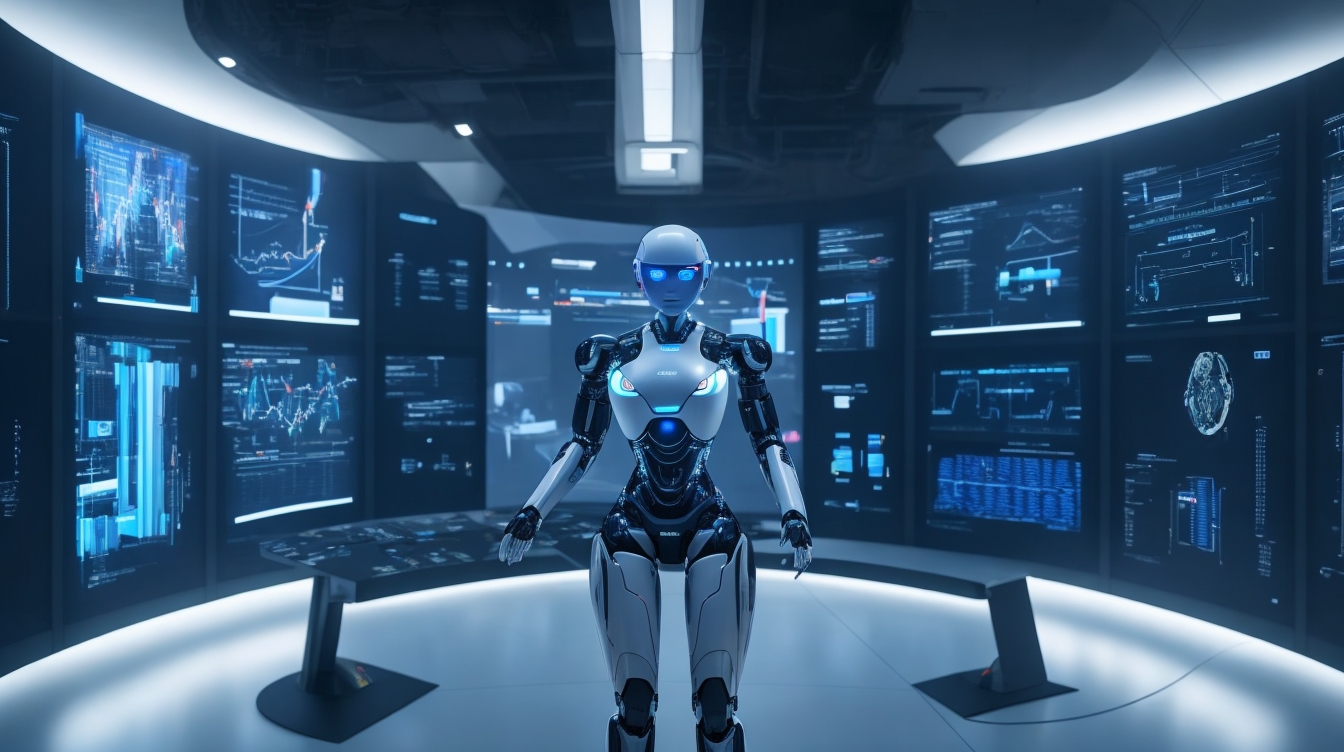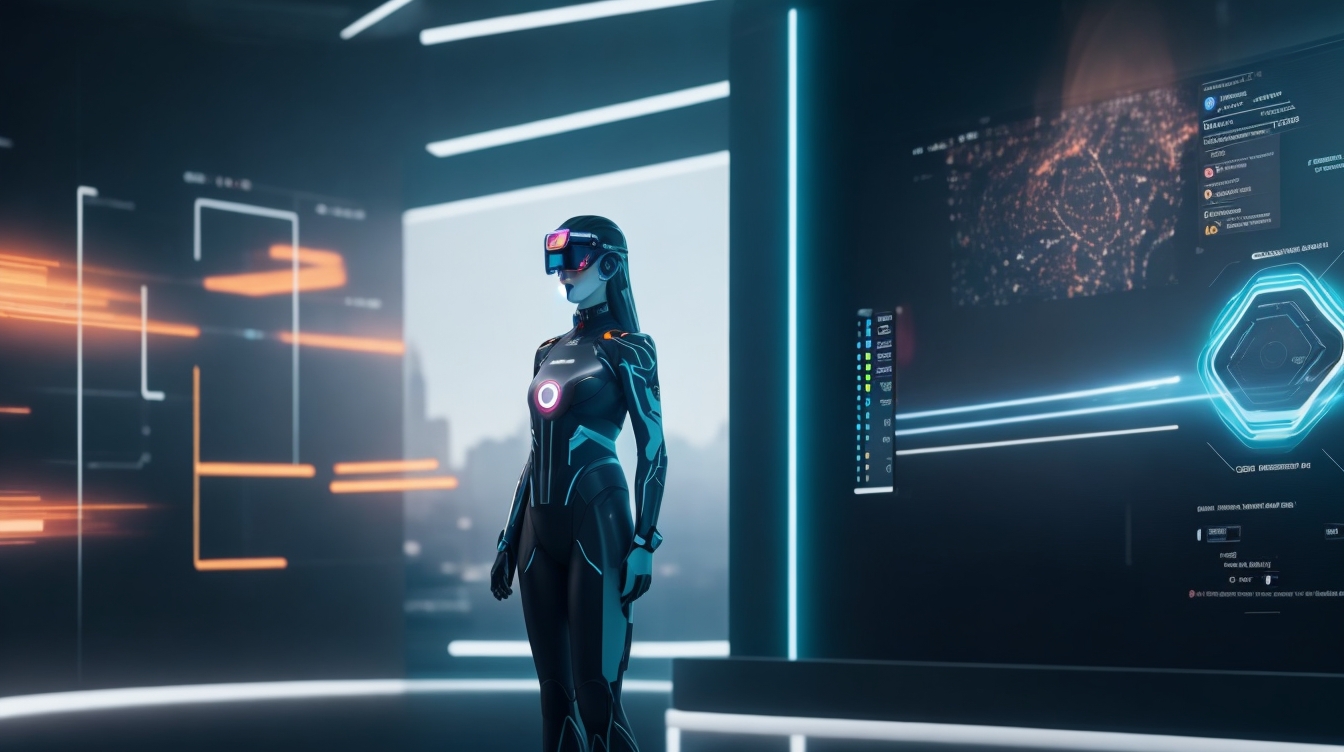Understanding the Concept: AI, or artificial intelligence, has been revolutionising numerous industries by automating repetitive tasks and analysing vast amounts of data. One such application of AI has been in the field of content generation. Content generation is the process of producing written material for various purposes, including blog articles, marketing material, social media posts, and more.
AI for content generation is the use of algorithms and machine learning models to produce written content that is not only coherent but also engaging, informative and SEO-optimised. This technology allows businesses to create high-quality content more quickly and efficiently, and with far less effort than traditional methods.
The Rise of AI in Content Creation: The demand for unique and engaging content is ever-growing due to the increasing amount of digital platforms and the need to capture the interest and attention of growing online audiences. As a result, businesses look for efficient ways to create vast amounts of content while maintaining quality. This necessity has led to the rise of AI in content creation, providing a solution that can offer high-quality output in a fraction of the time it would take a human writer.
How Does AI Content Creation Work?
The Role of Machine Learning: Machine learning plays an essential part in AI content generation. It allows algorithms to learn from the thousands of articles and examples fed into the system, identifying patterns in language and style. These algorithms then use this knowledge to generate coherent and high-quality content based on the specific requirements provided by the user, such as the topic or keywords.
The Process of AI Content Generation: The AI content generation process typically begins with the input of a prompt or a set of keywords provided by the user. The machine learning model then analyses the prompt and utilises its language and writing patterns knowledge to generate relevant content.
To ensure the content is engaging and easy to understand, the AI often relies on Natural Language Processing (NLP) and Natural Language Generation (NLG) techniques. These techniques enable the AI to understand context, maintain coherence, and improve the overall quality of its output.
Benefits of Using AI for Content Generation
Speed and Efficiency: One of the most significant advantages of using AI for content generation is the ability to produce large amounts of content quickly. AI-powered tools can generate articles, blog posts or social media captions in mere minutes, allowing businesses to focus on other critical tasks.
Cost-Effectiveness: Utilising AI for content generation can save businesses money compared to hiring a team of human writers. As the cost of developing and maintaining AI systems decreases, AI-generated content becomes a more affordable and attractive option for businesses looking to cut costs whilst maintaining quality.
Scalability: AI content generation tools have the potential to scale up their outputs as per the needs of a business. Companies can generate an increased amount of content without having to worry about hiring and training additional staff, making it a highly scalable solution.

Top AI Content Generation Tools
Overview of Popular Tools: Several AI content generation tools are available in the market, offering various features and capabilities. Some popular choices include:
- OpenAI’s GPT-3: One of the most advanced content generation tools, GPT-3 is known for producing highly sophisticated and coherent content.
- Jarvis.ai: Jarvis offers an easy-to-use content generation tool with an array of templates and customisable options.
- Copy.ai: Copy.ai is a versatile tool that offers content generation for blogs, social media, and marketing collateral.
Features and Benefits of Each Tool: Each AI content generation tool comes with its unique features and benefits. For example:
- OpenAI’s GPT-3 provides a high level of coherence and language understanding, ideal for creating complex content, such as research articles or white papers.
- Jarvis.ai focuses on producing engaging content and offers customisable templates for different industries, making it excellent for generating tailored content.
- Copy.ai provides a more cost-effective and versatile solution, allowing for content generation across various platforms and formats.
Real-World Applications of AI in Content Creation
Case Studies of Businesses Using AI: AI-powered content generation tools have been adopted by businesses across various industries to enhance their content creation process. For instance:
- Marketing agencies use AI-generated content to quickly produce multiple drafts of marketing materials for their clients.
- News outlets have started using AI-generated content to create drafts of news articles that human writers can then edit and polish.
- E-commerce companies use AI for content generation to create unique and engaging product descriptions.
The Impact of AI on Content Strategies: The adoption of AI in content creation is transforming the way businesses and individuals approach content strategies. With AI-generated content, marketers and writers can create more content at a faster rate, allowing businesses to maintain a consistent online presence and engage with their audiences more effectively.
The Future of AI in Content Generation
Predictions and Trends: As AI technology continues to advance, the future of AI in content generation looks promising. We can expect:
- Improved language models that generate increasingly sophisticated and human-like content.
- Greater integration of AI-generated content in various industries and applications, from journalism to creative writing.
- More AI-powered tools that target specific content niches and formats, allowing for even more customisable and tailored outputs.
How AI is Shaping the Content Landscape: The adoption of AI in content generation is reshaping the content industry as businesses and individuals harness the power of technology to improve their content creation processes. The technology is also pushing human creators to up their game, inspiring innovation and creativity in the world of content.
Challenges and Downsides to AI Content Generation
Addressing Plagiarism Concerns: One of the significant concerns regarding AI-generated content is the potential for plagiarism. As AI systems learn from existing content on the internet, it is essential to ensure that the generated content is unique and original. Many AI tools are now equipped with built-in plagiarism checkers to prevent duplicated content; however, users should still double-check the content to avoid any issues.
The Need for Human Review and Polishing: Although AI-generated content can be impressive, it is not flawless. Human intervention is still necessary to review, edit, and polish the content, ensuring it meets the standards of quality and adds value for the intended audience.
Conclusion: AI Content Generators as a Powerful Tool for Humans
The Synergy Between AI and Human Creativity: AI content generators, when combined with human creativity, can produce high-quality and engaging content with increased efficiency and reduced costs. This synergy allows businesses and content creators to leverage technology to meet the growing demand for unique and engaging content, without sacrificing their creative touch.
As AI continues to advance, the potential for content generation grows exponentially. By embracing the power of AI in content generation, businesses and individuals can revolutionise their content creation process, adapt to ever-changing digital landscapes and stay ahead of the competition.
Final Thoughts on the Role of AI in Content Generation
AI for content generation is no longer a futuristic concept; it is here, and its adoption is growing rapidly. By understanding how it works and leveraging its potential, businesses and individuals can harness the power of AI to create engaging, high-quality content. The combination of AI technology and human creativity is transforming the content generation landscape, setting the stage for a new era of innovation and growth.

The Role of AI in SEO Content Creation
SEO, or Search Engine Optimisation, is a crucial aspect of modern content creation. It ensures that your content can be discovered and ranked on search engines, driving organic traffic and engagement. AI can play a significant role in enhancing your SEO content creation process.
With advanced language understanding and natural language processing capabilities, AI content generation tools can create content that not only engages readers but is also optimised according to the latest SEO best practices. This includes keyword density, keyword variation, and readability. AI-powered tools can also intelligently suggest topic ideas and relevant keywords based on your target audience and competitors' analysis.
In addition, AI can help in analysing and optimising existing content, identifying areas of improvement and providing recommendations that can boost search engine rankings. This level of automation in SEO content creation can save businesses time and resources while improving their online visibility.
Ethical Considerations in AI Content Generation
As AI-generated content becomes increasingly popular, ethical concerns arise revolving around the potential misuse of this powerful technology. Some of the primary ethical considerations include:
-
Plagiarism: As AI systems learn from existing online content, there is a risk of generating content that may inadvertently plagiarise other sources. This could lead to legal and reputational issues for businesses using AI-generated content.
-
Misinformation: If not adequately validated, AI-generated content could potentially lead to the dissemination of misleading or incorrect information. It is crucial to ensure that the information in AI-generated content is accurate and fact-checked.
-
Bias: AI systems may inherit biases from their training data. Consequently, generated content could reflect these biases, leading to the creation of content with unfair or harmful implications. It is essential to address and minimise biases in the AI training process and ensure produced content meets ethical standards.
-
Intellectual Property: As AI-generated content becomes commonplace, questions arise about the ownership and authorship of the generated material. Clarifying legal and ethical guidelines around AI-generated content and intellectual property is essential.
AI and Personalised Content Creation
The growing trend of personalised content in the digital world is another area where AI can make a significant impact. Personalised content is tailored to individual user preferences and behaviours, leading to higher engagement and satisfaction.
AI’s ability to analyse large amounts of data allows businesses to gain deeper insights into their target audience, enabling them to create more personalised and relevant content. Additionally, AI-powered content generation tools can incorporate audience and user data to generate customised content, such as specific product recommendations, personalised marketing messages, and tailored content experiences that effectively engage users on a personal level.
By using AI in personalised content creation, businesses can enhance the user experience and create more targeted marketing campaigns that drive engagement, conversions, and customer loyalty.
The Impact of AI on Content Marketing ROI
Investing in AI-generated content can positively impact businesses' content marketing strategies and, consequently, their overall ROI (Return on Investment).
By streamlining content creation, decreasing costs, and increasing output, AI tools can lead to a more efficient content marketing operation. Improved content quality and relevance also contribute to higher engagement rates, which can result in increased website traffic, leads, and conversion rates.
Furthermore, AI can aid in content performance analysis, providing valuable data and insights that enable businesses to refine their strategies and focus on the most effective types of content for their audiences.
Overall, the use of AI in content generation and marketing has the potential to significantly improve content marketing ROI, allowing businesses to reap the rewards of their content efforts.
Training AI for Better Content Generation
One of the critical factors in the success of AI-generated content is the quality of the underlying machine learning model. To ensure the AI produces relevant, coherent, and valuable content, it is essential to train the system using appropriate data sets.
Training an AI content generation system involves feeding the algorithm with a sizable amount of high-quality textual data. This data should comprise various topics, formats, and styles, allowing the AI to learn and understand language structure, context, and patterns.
To further improve the content generation capabilities, businesses and developers should continue refining and updating the AI algorithm with new data regularly. This continuous learning and adaptation allow the AI to stay up-to-date with the latest trends, linguistic nuances, and content preferences, ensuring it remains relevant and produces high-quality content consistently.
By investing time and effort in training AI systems, businesses can benefit from improved content generation processes, elevating the quality, efficiency, and impact of their content marketing initiatives.

AI Automation Agency Services for Authority Websites
AI-powered automation agency services are transforming the landscape of authority websites by streamlining content creation and optimisation. Authority websites are built with a focus on providing expert information and establishing credibility within a specific niche. With the help of AI, businesses can create well-researched, engaging, and SEO-optimised content that boosts their reputation and builds trust with their target audience.
AI-driven agency services can provide in-depth niche analysis, identifying gaps in existing content and discovering untapped opportunities for businesses to demonstrate their expertise. By generating high-quality, fact-based content backed by thorough research, AI-powered tools can help businesses establish themselves as thought leaders in their respective industries. This results in improved credibility, better search engine rankings, and increased website traffic.
AI for Social Media Posts
AI-driven tools are also reshaping social media content strategies by automating the generation of engaging and shareable posts. AI-powered services enable businesses to maintain an active presence on social media platforms with minimal manual effort.
These tools can analyse data from various sources, such as user profiles, demographics, and past online behaviour, to provide targeted and personalised social media posts that resonate with the audience. Moreover, AI-powered scheduling tools can optimise posting frequency and times, ensuring that content receives maximum visibility and engagement from potential customers.
AI-driven tools can also analyse social media metrics and user responses to provide insights into creating more effective social media campaigns, resulting in improved brand awareness, customer loyalty, and conversion rates.
AI in Creating Feature Images
Visual content is a vital part of any digital marketing strategy, and AI can play an essential role in creating feature images for articles, blog posts, and social media updates. AI-powered tools leverage machine learning algorithms and vast image databases to generate eye-catching, contextually relevant, and aesthetically pleasing feature images tailored to the specific content.
These tools can understand the content's context and main ideas, returning images that perfectly complement the written material. AI-driven design tools can also be used to customise these feature images, adding text, logos, and brand elements to create visually appealing and consistent content across different platforms.
AI-Driven Apps for Content Creation and Marketing
The rise of AI technology has led to the development of various AI-driven apps that cater to content creation and marketing needs. These apps come with user-friendly interfaces and powerful features, enabling businesses to streamline their content creation efforts with minimal time and resources.
For instance, AI-driven apps can offer instant content generation based on user inputs, providing quick and relevant content on-demand. The apps can also generate data-driven insights into content performance and audience preferences, allowing businesses to optimise their strategies and improve engagement rates.
Furthermore, AI-driven apps can help automate content distribution across multiple channels and platforms, enhancing the overall efficiency and effectiveness of the content marketing process.
By integrating AI-driven tools and agency services in content generation and marketing efforts, businesses can gain a competitive edge, improve their online presence and efficiently drive engagement, conversions, and ultimately, revenue growth.

FAQs
How does AI content generation work, and what role does machine learning play in it?
AI content generation relies on advanced algorithms and machine learning models to produce written content based on specific user requirements. Machine learning plays a vital role by allowing the AI algorithm to learn from thousands of articles, identifying patterns in language and style. Combining this knowledge with Natural Language Processing (NLP) and Natural Language Generation (NLG) techniques, the AI generates coherent, engaging, and contextually relevant content.
What are some of the ethical considerations in using AI-generated content?
Several ethical considerations are associated with AI-generated content, including plagiarism, misinformation, bias, and intellectual property concerns. Businesses should be vigilant in ensuring that the AI-generated content is free from these issues and meets ethical standards by double-checking its originality, fact-checking the information, addressing biases in the training data, and adhering to intellectual property guidelines.
How can AI improve the content creation process for authority websites?
AI can streamline content creation for authority websites by automating research, analysis, and content generation. AI-driven agency services can identify gaps in existing content and discover opportunities for businesses to establish themselves as thought leaders within their niches. The AI-generated content for authority websites focuses on in-depth and well-researched information, boosting the website's credibility and reputation while improving search engine rankings.
How can AI help create personalised content and its impact on digital marketing strategies?
The use of AI in content creation enables businesses to produce personalised content based on individual user preferences and behaviours. By leveraging AI's capability to analyse vast amounts of data and integrate audience insights, businesses can generate content that effectively engages users on a personal level. Personalised content driven by AI aids in enhancing user experience, creating targeted marketing campaigns, and ultimately driving engagement, conversions, and customer loyalty.
What steps can be taken to optimise AI training for better content generation outcomes?
To improve the quality and relevance of AI-generated content, it is crucial to train the AI algorithm using appropriate data sets that include various topics, formats, and styles. Regular refinement and updating of the AI system with new data ensure that the AI remains current with the latest trends, linguistic nuances, and content preferences. By investing time and effort in training AI models, businesses can benefit from a more efficient content creation process and enhanced content marketing initiatives.


